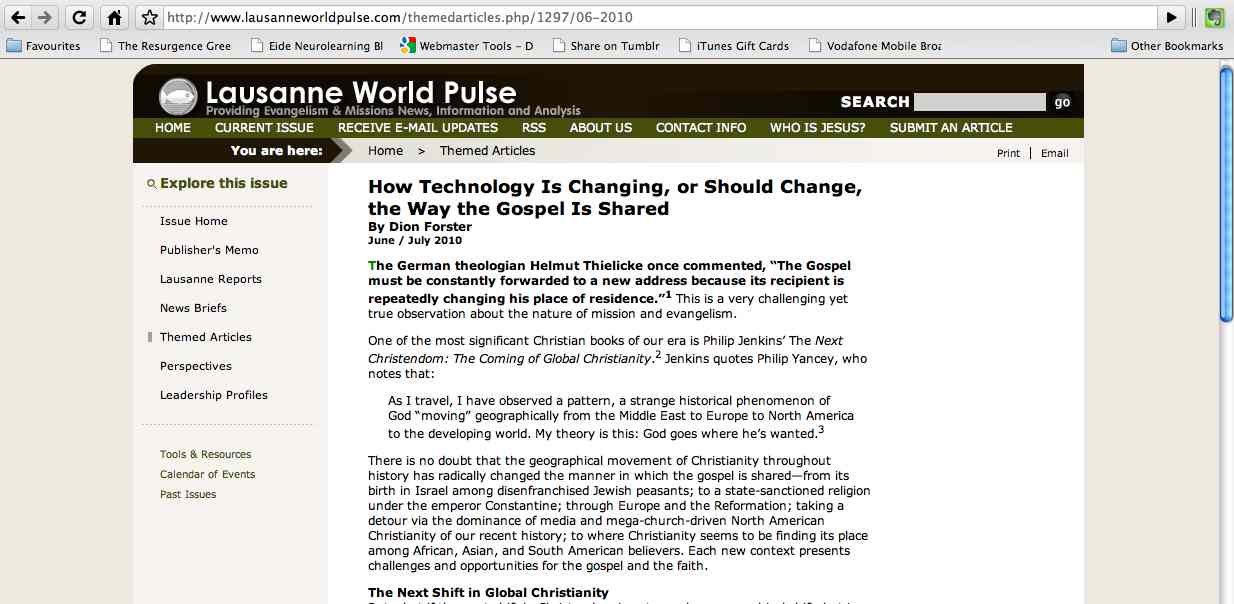How technology is changing, or should change, the way the Gospel is shared
 Tuesday, June 1, 2010 at 9:32PM
Tuesday, June 1, 2010 at 9:32PM  The June / July edition of the Lausanne World Pulse was released today. I am so blessed that an article that I wrote has been published in this edition.
The June / July edition of the Lausanne World Pulse was released today. I am so blessed that an article that I wrote has been published in this edition.
In the introduction to this edition of the Lausanne World Pulse Doug Birdsall writes of the fact that the unchanging message of the person and ministry of Jesus must be presented in new and effective ways to encounter the evolving expectations and experiences of people across the world. He notes that technology, and particularly communication technologies, are having a radical effect on the globe, and so too on the way in which we can engage the people of the world with the Gospel of Christ. Of course communication technology is but one small part of the changing landscape of the world - advances in science, medicine, economics and even warfare all have to be taken into account if one is to bring the Gospel of Christ to bear on the world in order to work for Christ driven healing and transformation.
There are some wonderful scholarly and popular articles to get one thinking and praying along those lines.
My article is entitled 'How technology is changing, or should change, the way the Gospel is shared'. Here is an excerpt from the introduction to the article:
The German theologian Helmut Thielicke once commented, “The Gospel must be constantly forwarded to a new address because its recipient is repeatedly changing his place of residence.” This is a very challenging yet true observation about the nature of mission and evangelism.
One of the most significant Christian books of our era is Philip Jenkins’ The Next Christendom: The Coming of Global Christianity. Jenkins quotes Philip Yancey, who notes that:
As I travel, I have observed a pattern, a strange historical phenomenon of God “moving” geographically from the Middle East to Europe to North America to the developing world. My theory is this: God goes where he’s wanted.
There is no doubt that the geographical movement of Christianity throughout history has radically changed the manner in which the gospel is shared—from its birth in Israel among disenfranchised Jewish peasants; to a state-sanctioned religion under the emperor Constantine; through Europe and the Reformation; taking a detour via the dominance of media and mega-church-driven North American Christianity of our recent history; to where Christianity seems to be finding its place among African, Asian, and South American believers. Each new context presents challenges and opportunities for the gospel and the faith.
The Next Shift in Global Christianity
But what if the next shift in Christendom is not merely a geographical shift, but in fact a shift into cyberspace—a movement of a completely different kind?
Have you given much thought to the way in which the 'next shift' in global culture is reshaping the way in which to Gospel should be shared? I would like to encourage you to read this month's articles on the impact of technology on Christianity and the world.
If you have some ideas, or maybe some examples or more compelling statistics to share, please drop a line in the comments below.




Reader Comments (1)
You set me considering how technology impacts these commandments. Much of these two commandments are immune to technological change, except for the word neighbour. Not only does technology change who is our neighbour but it changes our perception of who is our neighbour and our perception of our neighbours place and needs.
For many in the West the last few decades of the 20th century was an age when technology made us remote from each other - TV, Radio, Web 1.0, faster cheaper transport. It was a struggle to consider anyone as our neighbour; brothers and sisters in Christ, family, friends, yes, but neighbours, even if they lived next door they were remote.
In the 21st century we seem to moving from an age of no neighbours to age were we can accept people we have connections to as neighbours and learn to love them. This isn't just true of our facebook friends but of the workers in the Chinese factory who makes our iPhone or the farmer in Thailand who rears our chicken or the teenager enslaved in West Africa who picks the cocoa to make our chocolate.
Skye Jethani put the change down to the Boeing 747 in his blog article The Jumbo Jet Generation. Certainly this played a part, but I would suggest it is the geography-free building of links and networks interconnecting people on Facebook and Twitter and many other tools which is changing our perception of who is our neighbour.
Even more importantly is the relationships with our neighbours across the world are becoming more equal. Somehow the technology is stamping on the pride of the West and communication about Africa, Asia and South America as much more positive and realistic. People who were objects of our proud charitable giving have become real people, our neighbours.
We moved from an age with local geography and local connections to an age when we lost our connections but kept the geography. The new age is one were geography is simply of no importance but we have regained our ability to connect. May our Father God graciously fills us with his love to overflowing so our connections further His Kingdom.